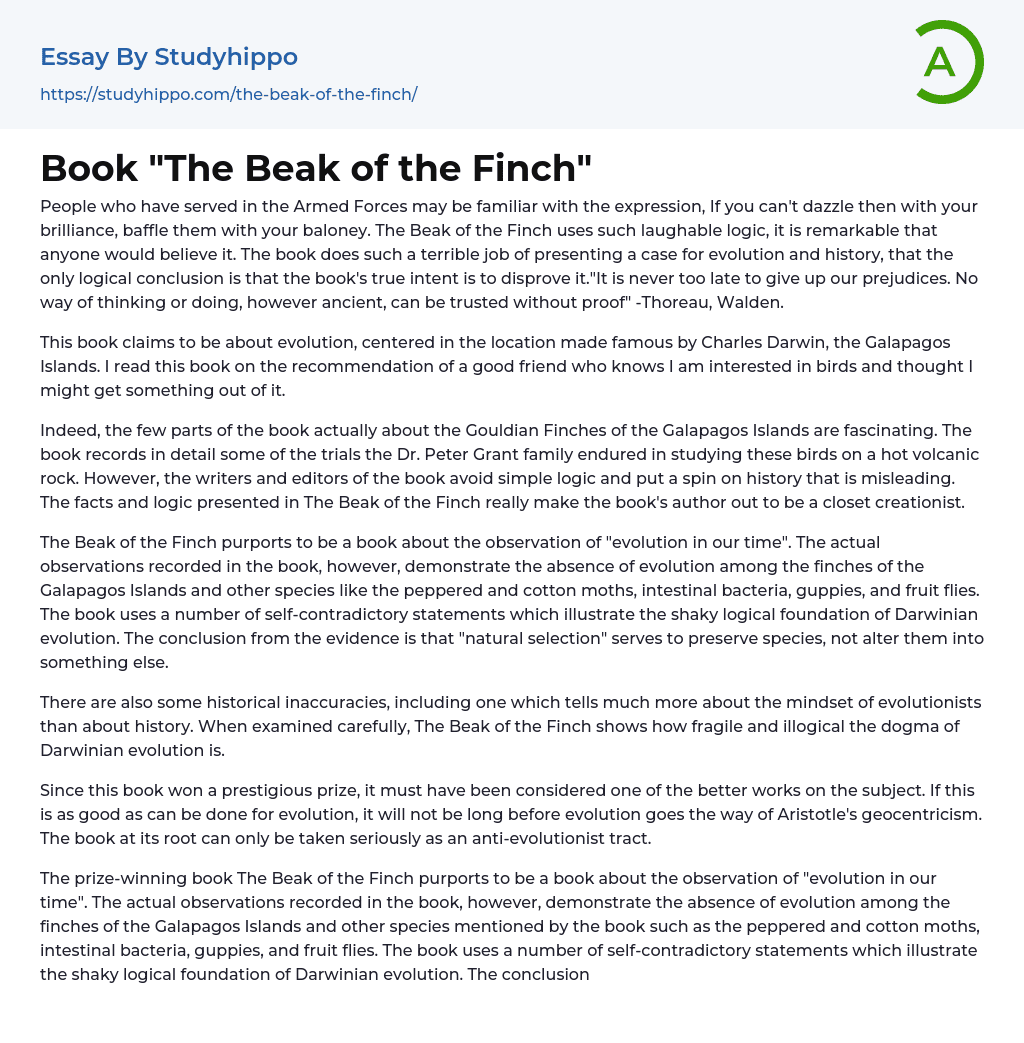The book "The Beak of the Finch" employs a nonsensical reasoning comparable to the adage "If you can't impress them with your intelligence, confuse them with nonsense." It is astonishing that anyone would endorse this line of thinking because it lacks a persuasive case for evolution and history. This implies that the actual intention of the book is to undermine the credibility of evolution. As Thoreau astutely stated in his work "Walden," "It's never too late to relinquish our biases. No mindset or behavior, regardless of its age, should be relied upon without evidence."
This book, which focuses on the Galapagos Islands made famous by Charles Darwin, is about evolution. I chose to read it because a close friend, who knows my interest in birds, believed it would be valuable to me.
The Beak of the Finch claims to be a book about obse
...rving "evolution in our time". However, the actual observations documented in the book show that there is no evolution occurring among the finches of the Galapagos Islands and other species such as peppered and cotton moths, intestinal bacteria, guppies, and fruit flies. The book presents several contradictory statements that highlight the uncertain logical basis of Darwinian evolution. Based on the evidence, it can be concluded that "natural selection" functions to maintain species rather than transforming them into something different.
The book The Beak of the Finch examines historical inaccuracies, which provide insight into the mindset of evolutionists rather than focusing on history itself. Through careful analysis, it uncovers the fragility and illogical aspects of the dogma of Darwinian evolution.
The book called The Beak of the Finch, which received a
prize, purports to be about observing "evolution in our time". However, the actual observations showcased in the book demonstrate the lack of evolution among various species mentioned, such as finches from the Galapagos Islands, peppered and cotton moths, intestinal bacteria, guppies, and fruit flies. These observations also expose self-contradictory statements that underscore the weak logical foundation of Darwinian evolution. Based on this evidence, it can be concluded that "natural selection" functions more to preserve species rather than transforming them into something different. Additionally, there are historical inaccuracies in the book that shed light on the mindset of evolutionists rather than providing factual information about history.The text within the is empty.
- Agriculture essays
- Albert einstein essays
- Animals essays
- Archaeology essays
- Bear essays
- Biology essays
- Birds essays
- Butterfly essays
- Cat essays
- Charles Darwin essays
- Chemistry essays
- Dinosaur essays
- Discovery essays
- Dolphin essays
- Elephant essays
- Eli Whitney essays
- Environmental Science essays
- Evolution essays
- Fish essays
- Genetics essays
- Horse essays
- Human Evolution essays
- Isaac Newton essays
- Journal essays
- Linguistics essays
- Lion essays
- Logic essays
- Mars essays
- Methodology essays
- Mineralogy essays
- Monkey essays
- Moon essays
- Mythology essays
- Noam Chomsky essays
- Physics essays
- Plate Tectonics essays
- Progress essays
- Reaction Rate essays
- Roman Numerals essays
- Scientific essays
- Scientific Method essays
- Scientist essays
- Seismology essays
- Space Exploration essays
- Stars essays
- Sun essays
- Thomas Edison essays
- Tiger essays
- Time Travel essays
- Universe essays




